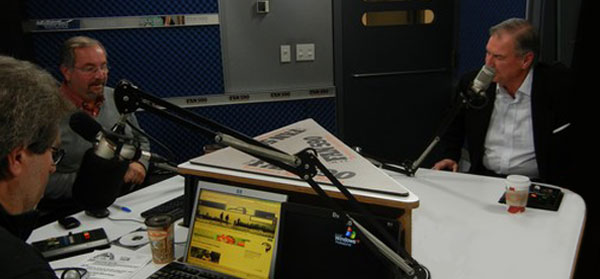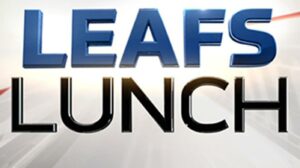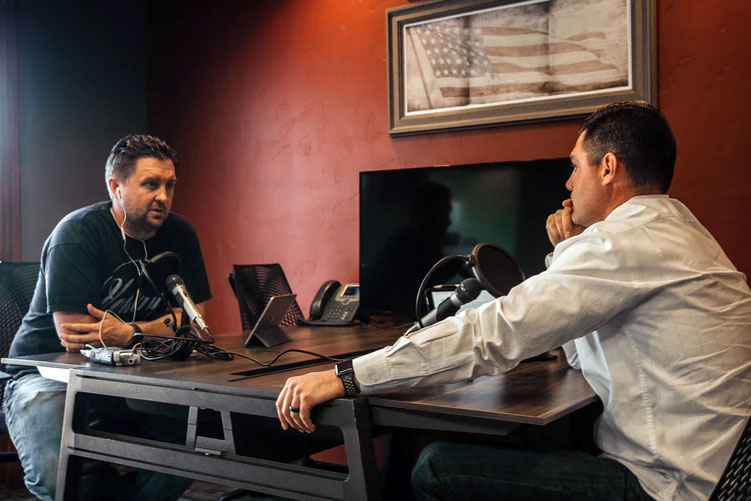

In what should have been an exceptionally exciting week in Canadian sports, Bell, and Post Media followed the Athletic with cuts that reverberated around the industry. Is sports radio really dead? Do those in charge actually care? Here are my thoughts after the Canadian Open, Stanley Cup Final and NBA Championship and my sit down with Stephen Brunt in The Pressrow.
Thank you for the overwhelming feedback on my Kyle Dubas article.
I maintain an unyielding optimism. At my core, I am convinced that we, as consumers, persistently seek and demand sports media content. Despite the changing technology over the years, I steadfastly refuse to accept that this craving is diminishing. However, it has become evident that the two most prominent media companies in Canada lack interest in further investing in their sports media assets. The decision-makers at Bell and Rogers seemingly do not believe in the future of sports media. Their actions, consisting of relentless cost-cutting without a foreseeable end, can only be interpreted this way.
For years, I’ve held the belief that content consumption is primarily about the medium and method rather than the label. The future of “print newspapers” or “terrestrial radio” doesn’t particularly concern me. However, I am confident that someone will devise a way to monetize the production of digital content, whether it’s written or audio/video.
The recent cuts made by Bell, however, have heightened my concerns that the timeline for someone to devise a new model may be significantly shorter than anticipated, as the relentless reductions have led to actual station closures. Bell eliminated 1300 jobs, and even more shockingly, the show ‘Leafs Lunch’ was canceled. This is not to imply that ‘Leafs Lunch’ was a particularly outstanding show. Rather, the fact that a show with the Maple Leafs’ name, running during their season, couldn’t be justified to the decision-makers, provides insightful commentary on the motivations of those in charge. These actions are based strictly on financial considerations, not on the content’s quality or its audience.

In my view, anyone currently employed in the radio or sports industry should actively explore alternatives to their existing platforms. This isn’t to say they should abandon the medium altogether, but rather consider distancing themselves from the current producers. It’s clear that these two outlets, Bell and Rogers, are no longer investing in their platforms. If you are on-air talent, a producer, or part of the show’s team, it would be worthwhile to seriously consider alternatives to these two companies. Podcast networks, streaming platforms, and other emerging outlets investing in audience growth and content branding offer much more promising prospects at present compared to the legacy companies who are wrongly attributing their issues to others.
Roger’s contract with the NHL is set to expire after the 2025-2026 season.  Rumor has it that the deal includes substantial price escalators towards the end of the contract. Some speculations suggest that in the last two to three years, the cost could surge by a staggering $50 to $100 million. When considering this alongside the acquisition costs associated with the Shaw deal, the upcoming summer could be extremely turbulent for our colleagues at Rogers.
Rumor has it that the deal includes substantial price escalators towards the end of the contract. Some speculations suggest that in the last two to three years, the cost could surge by a staggering $50 to $100 million. When considering this alongside the acquisition costs associated with the Shaw deal, the upcoming summer could be extremely turbulent for our colleagues at Rogers.
Low TV ratings for the NHL can’t help either. “The Canadian viewing audience for the game ( 2,124,000 viewers ages 2+ across Canada) was slightly less than half of the peak number of viewers drawn by the Toronto Maple Leafs in their opening round action vs. the Tampa Bay Lightning. Leafs round 1 clincher drew close to 4.4 million viewers in overnight ratings.”
Whispers within the industry imply that the inflated team around the Jays might be subject to Colette’s downsizing. Simultaneously, there is a fair amount of speculation about the longevity of the pre-game show on Hockey Night in Canada. The most common question I received while in Las Vegas after the Stanley Cup was regarding who from the panel would be returning. Many within the network anticipate shifts in staffing and potentially a reduction in the number of panel members. There are also questions about contract expectations of current panel members, which need to be evaluated in light of fair market value.
Regarding Rogers’ radio segment, it’s unclear to me what they might decide to cut. I’ve heard that Kypreos’ contract is due for renewal. Will it be extended for another year? Could they possibly transition Marek to a podcast-exclusive show? Would any of these moves genuinely result in significant savings? All these decisions would hinge on the specific savings target set by the decision-makers. What is the targeted amount and how severe must the cuts be to achieve it?
At one stage, it seemed that both 590 and 1050 would remain stable until the expiry of the current radio deals for the Leafs and Raptors, both due in 2026. However, given how they, along with the Jays, have been managed, can you envisage a scenario where either or both stations could simply be shut down? Could all shows transition into podcasts or be simulcast from TV?
Overdrive indisputably leads the market, that’s unquestionable. Who follows next in line? Personally, I appreciate the morning drive shows from both stations, but since I don’t reside in the Greater Toronto Area, I’m not their target audience. Hence, I wouldn’t mind if both shows transitioned to streaming exclusively. Bunkis’s show, in its current format, actually excels and serves as a model for what a contemporary streaming show could look like and the advantages it offers. There’s no inherent necessity for the Raptors show and Blair/Barker to be on the radio, is there? However, one could argue that Blair’s older demographic might need a terrestrial radio platform, I suppose.
 I would imagine that for those commuting during hockey season, the Kyrpeos/Marek and Leafs Lunch shows provide quality radio entertainment. While I personally stream both, I can certainly envision a live audience for both programs. The real quandary lies with the traditional afternoon drive time. Here in Seattle, corporations are reinstating office work, leading to heavily congested traffic. Consequently, people are back in their cars. If I were in Toronto during the morning or afternoon commute, I’d be tuning in live. But, that’s just me.
I would imagine that for those commuting during hockey season, the Kyrpeos/Marek and Leafs Lunch shows provide quality radio entertainment. While I personally stream both, I can certainly envision a live audience for both programs. The real quandary lies with the traditional afternoon drive time. Here in Seattle, corporations are reinstating office work, leading to heavily congested traffic. Consequently, people are back in their cars. If I were in Toronto during the morning or afternoon commute, I’d be tuning in live. But, that’s just me.
Following the recent developments, it seems that the decision-makers perceive no inherent value in radio. Consequently, I can envisage a scenario where Overdrive, despite its progress, becomes exclusively a TV/streaming show. As for the Ennis/Murphy show on the Fan, which serves as a good alternative to Overdrive, perhaps it could adopt the Bunkis model.
The situation at Bell was dire last week, and it appears to be a harbinger of what’s to come at Rogers. This sentiment was palpable when I was in Las Vegas, and was further affirmed upon my return home. People are steeling themselves for the worst.
 Speaking of the worst, The Athletic and Post Media continued to make this amongst the worst sports media weeks in recent history. The Athletic promptly gutted 4% of their workforce as they pivot their broad attention to a more big story focus. “We’ve reorganized The Athletic’s newsroom to ensure we’re structured to enact our strategy to cover the most compelling stories that matter to fans across all the teams in a given league daily. To achieve this, we’re enhancing how we combine the local and national expertise that’s always set our journalism apart.”
Speaking of the worst, The Athletic and Post Media continued to make this amongst the worst sports media weeks in recent history. The Athletic promptly gutted 4% of their workforce as they pivot their broad attention to a more big story focus. “We’ve reorganized The Athletic’s newsroom to ensure we’re structured to enact our strategy to cover the most compelling stories that matter to fans across all the teams in a given league daily. To achieve this, we’re enhancing how we combine the local and national expertise that’s always set our journalism apart.”
This decision has left numerous markets with teams that no longer have beat writers from The Athletic. For instance, in Seattle, both the Kraken and the Mariners are now without coverage from The Athletic. In Toronto, Sean Fitz-Gerald, a long-standing reporter who covered the media beat, was let go. During my conversations with journalists in Las Vegas, there was a palpable sense of frustration. When I probed their thoughts on sustaining unprofitable markets, they referred back to the very leagues these writers were covering as a potential model. A number of writers expressed disappointment because they felt that The Athletic’s original intention of supporting all markets had been forsaken. They acknowledged that markets like Toronto in the NHL would be immense, and national writers would be highly sought after. However, they maintained that the model should be designed to accommodate both large and small markets, not solely the larger ones.
The week ended with Post Media surprisingly throwing two long-time writers overboard. Scott Stinson and John Kryk. These moves were surprising in that other Post Media moves game weeks ago and the timing of these seems odd. Sounds like some were protected by their union while others maybe not so much. In any event, both are fantastic writers who should have gigs writing somewhere soon.
 I am told by the way, that things are not good over at the Toronto Star either. The financial forecast at both the Star and Post Media right now is bleak and employees are rightfully concerned and that morale is very poor. In both cases, this is broadly speaking and not just a sports department issue. It sounds like much of the hope for a turnaround or a soft landing at the Star that had been hoped for under new ownership has not materialized and that much more difficult days are ahead.
I am told by the way, that things are not good over at the Toronto Star either. The financial forecast at both the Star and Post Media right now is bleak and employees are rightfully concerned and that morale is very poor. In both cases, this is broadly speaking and not just a sports department issue. It sounds like much of the hope for a turnaround or a soft landing at the Star that had been hoped for under new ownership has not materialized and that much more difficult days are ahead.
As I’ve mentioned before, I’m an optimist. I firmly believe in the future of media, including sports media. However, I’m less confident that the solution will be pioneered in Canada; it’s more likely that someone in the US will develop the new platform or model, which will then either be replicated or imported. Unfortunately, the companies best positioned for success – those possessing the technology, data, and expertise to provide the best customer experience – seemingly don’t understand, aren’t interested, and have dropped the ball. Evidently, their primary focus now is solely on the bottom line, which is concerning. That said, this situation also presents a tremendous opportunity for others to fill the gap. Just as Uber disrupted the taxi industry and Airbnb the hotel sector, a future for media consumption inclusive of sports awaits us. We simply haven’t discovered the monetization model… yet.
Not very often that one scribe carries the torch on a story like Bruce Garrioch did on the sale of the Ottawa Senators. This was one of the most unique sales in sports history and Bruce had it covered from the get-go. Congrats to him on a job well done.
On a personal note, my youngest, my daughter graduated high school this week. With graduation on my mind, I found it interesting that Kyle Dubas spoke at Brock’s graduation.
Emperor Dubas lured Darth Spezza this week in Pittsburgh to the delight of Dubas nation and the chagrin of Leaf’s nation. At the same time, Dubas gave a pretty hilarious convocation speech at Brock University mentioning his own termination and his own failures. Some think he shouldn’t have gone there, personally, I think it was pretty funny and hopefully a good end to the saga.
Finally, things are really humming on the podcast here.
 Stephen Brunt joined me this week #inthepressrow and did not disappoint. You all know Brunt, so instead of my typical line of questions, I decided to ask Stephen more about the issues du jour, mostly because so much is going on and I wanted to hear his take on so many of the sports issues du jour. For example, I asked Stephen about the Athletic cutting 4% of their staff and how their writers are evaluated on clicks and pageviews:
Stephen Brunt joined me this week #inthepressrow and did not disappoint. You all know Brunt, so instead of my typical line of questions, I decided to ask Stephen more about the issues du jour, mostly because so much is going on and I wanted to hear his take on so many of the sports issues du jour. For example, I asked Stephen about the Athletic cutting 4% of their staff and how their writers are evaluated on clicks and pageviews:
“I get why they do it, and the Athletic has been very upfront about their model but writing to drive traffic is horrible on the journalistic side of things”
On working with Bob McCown and Prime Time Sports
“It was fun. It was a match made in heaven. I was on the number one show in Canada and it was fun. It was a blast. I had a knack for it and it served me really well.”
Listen or watch below to Stephen Brunt

One Reply to “Bell Let’s Cut Week Headlines Transformational Media Week on & Stephen Brunt In The PressRow”